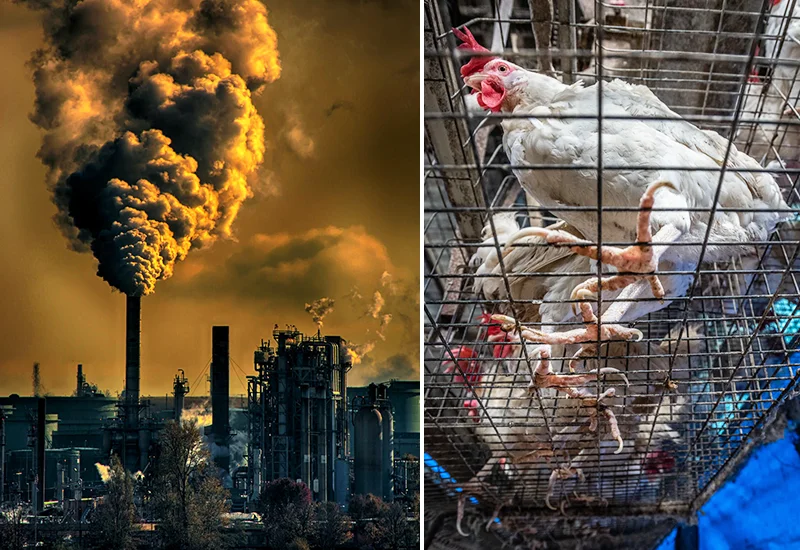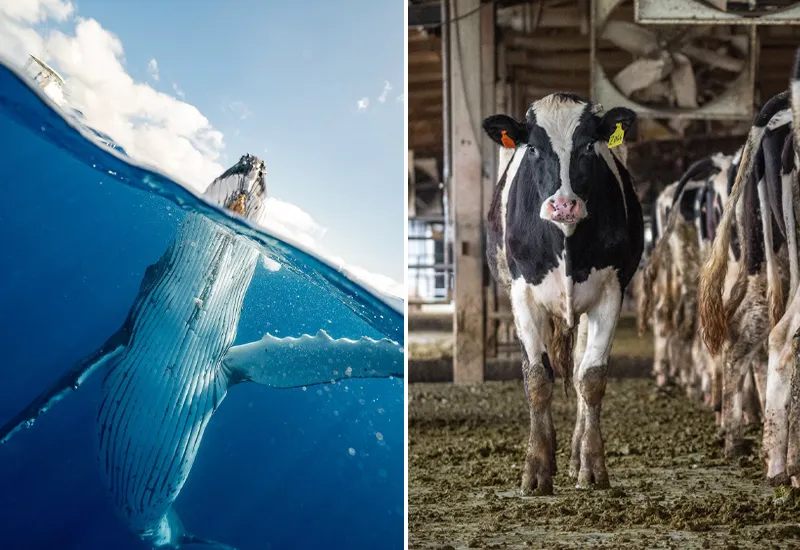Want to learn more about the laws that protect our environment, animals and the principles of sustainability? Then you've come to the right place! At a time when Environmental issues as species extinction and climate change are increasingly urgent challenges, legal frameworks are crucial to mastering them on a society-wide basis.
In this article I would like to introduce you to the most important laws, ordinances and regulations that serve to protect and preserve our planet, animal welfare and the promotion of sustainable action. Let's go!
First of all, I'll give you a brief overview here:
10 reasons: Why are laws for environmental protection, animal welfare and more sustainability so important?

The embedded poster from a climate demonstration actually describes it quite well: there are no jobs on a dead planet. And the earth is dying solely as a result of human behavior. The laws for environmental protection, animal welfare and sustainable action are so important above all because they change our way of life in such a way that we ultimately not endanger nature or ourselves.
But the motives are basically very multilayered and extensive. The most important advantages and reasons for (stricter) animal welfare and environmental protection laws I have therefore compiled for you here clearly.
1. protection of biological diversity
The global species extinction is one of our greatest environmental challenges. Countless plant and animal species are threatened with extinction. Comprehensive laws can help protect their habitat and illegal activities such as poaching, Overfishing or prevent illegal logging.
2. protection of the atmosphere
Clear legislation helps to ensure that the Limit greenhouse gas emissions and thus the man-made climate change to combat. This can be achieved, for example, through the regulation of industry and transport, the targeted promotion of renewable energies, or CO2 pricing.
3. promotion of sustainable action
Standards and requirements can be defined in environmental protection laws that Motivate consumers and also entrepreneurs to, to act more sustainably.
In private households, set standards and guidelines can, for example. Encourage a preference for an organic, plant-based, balanced diet.. And in companies, for example, the Interest in investing in more energy-efficient buildings, machinery and vehicles, in reducing waste generation or in promoting circular economy models.
4. environment and animals do not have a big lobby
Unlike private or economic interest groups unfortunately, animals and nature cannot stand up for their own interests to us. Laws are accordingly important to ensure that our fellow creatures without a human voice are also considered in decision-making processes.
5. protection of human survival
Ultimately, the survival of the human species depends on the health of our planet. Through the Preservation of biodiversity, the protection of the natural resources and climate-friendly action, the corresponding legislation thus contributes to the long-term security of human society at.
6. reconciliation of interests
Laws for environmental protection, animal welfare and sustainability also serve to strike a fair balance between different interest groups -. for example between economic development and nature conservation. This is the only way to ensure that short-term economic interests do not lead to long-term, reversible, ecological damage.
Tip: The achievement of the Climate tipping points is a good example of irreversible environmental damage, with even more disastrous consequences.
7. prevention and sanctioning of environmental pollution
With the help of laws set severe penalties for companies and individuals be made that violate regulations intended to protect nature or animals. This can, for example, the Air impurities, of water and soil minimized and countless cases of cruelty to animals be prevented.
8. promoting awareness and education
Environmental, animal welfare and sustainability laws can help to reduce the Environmental awareness in society as well as the Environmental Education to strengthen them. Experience has shown that the corresponding rules and regulations have an educational and awareness-raising steering effect.
9. international cooperation and commitments
Many environmental and animal protection issues do not stop at national borders, but are global in nature and require international cooperation. Clear laws for nature conservation help in this regard, Important framework conditions for compliance with international agreements to be defined and to promote cooperation between the countries.
10. promotion of green technologies
sustainability laws or guidelines for environmental or animal protection, can also be Incentives for investment in research and development (or further development) of green technologies. In this way, legislation can be used above all to create a new "culture of innovation" that brings more environmentally friendly products and services to market, making sustainable action even easier for everyone.
Criticism: Why is there nevertheless a great deal of excitement when bans and regulations are introduced for nature conservation?

Despite the obvious advantages, which bring laws for environmental protection, animal welfare and the promotion of sustainability, there is usually considerable resistance and great indignation when the state decides on corresponding legal bans and regulations.
Why is that? There are many reasons for this. Here I have collected some of them clearly:
- Economic interestsEspecially when it comes to short-term profits, greed and the profit motive of many entrepreneurs are greater than their environmental awareness. But on a dead planet finally no economic activity will be possible.
- Jobs: Many people worry that stricter environmental laws could cost countless jobs. This is especially the case in industries that are by nature heavily polluting or simply do not rely on sustainable practices. In fact, and logically, environmentally friendly innovations and businesses naturally create many new jobs.
- Personal freedom: Some people see environmental laws and regulations as interfering with their personal freedoms - through speed limits or driving bans, for example. In the end, the social character merely changes somewhat from the Selfishness to more solidarity.
- DoubtThe excitement about environmental protection laws is also often great because people doubt the sense of the regulations. Some doubt is in principle always useful but in these cases often misplaced, because draft laws and adopted laws usually include compromises anyway.
- Unfair loadOften there are concerns that environmental protection laws tend to place a financial burden on the poorer section of the population. This may well be the case, but it is not the rule, at least in Germany. In the end, for example, only food that is harmful to the climate becomes more expensive.
- Complexity: Another point of criticism relates to the bureaucratic effort involved in complying with environmental and animal protection laws. This can be a major challenge, especially for small and medium-sized enterprises. However, this should not prevent us as a society as a whole from acting in a more nature-friendly way in the long term.
Conservation Laws: Which legal guidelines and regulations protect the environment?

A number of laws, regulations, and international agreements establish measures designed to, Prevent or minimize environmental damage and to promote the sustainable use of natural resources.
"Plans to protect air and water, wilderness and nature are in fact plans to protect man."
Stewart Udall (more at Environmental protection quotes)
Finally, compliance with the relevant legislation also helps us, protect ourselves. The following laws for environmental protection provide a valuable framework for the conservation of nature.
Washington Convention on International Trade in Endangered Species (CITES)
The Washington Convention on International Trade in Endangered Species of Wild Fauna and Flora is an international treaty on the protection of endangered species. Agreement reached regulating trade in certain endangered species of wild animals and plants. It was introduced on March 3, 1973, and aims to prevent threats from excessive trade in wildlife and plant species.
The agreement controlled, regulated and limited international trade in endangered species and the products made from them. Without this law, things would be much worse for tigers, elephants, whales or sharks and their habitats, for example.₁ For example, it regulates the handling of tropical woods such as rosewood and defines Exemptions for products such as musical instruments, which in terms of quantity, for example, compared to furniture, the use of rosewood is very limited.
Water Resources Act (WHG)
The Water Resources Act is a German federal lawthat the Water management - and thus also their protection.
The Environmental Protection Act sets out the Framework conditions for the sustainable use of water resources in Germany and also regulates, among other things, flood protection and water use. It also includes provisions for the prevention and elimination of water pollution and is intended to ensure the supply of drinking water to the population (and future generations).
Federal Nature Conservation Act (BNatSchG)
With the Federal Nature Conservation Act a central law for nature conservation and landscape management was passed in Germany. It establishes the basic principles and objectives of nature conservation and contains, among other things, regulations for measures for the conservation and development of nature and landscape, for the protection of animal and plant species, for the protection of biotopes and landscape elements, as well as regulations for interventions in nature and landscape.
For example, § 44 para. 1 no. 4 BNatSchG prohibits, to take wild plants of the specially protected species or their development forms from nature, to damage or destroy them.
Federal Climate Protection Act (KSG)
The Federal Climate Protection Act, which was adopted in 2019, is intended to improve the Meeting national climate protection targets and complying with European targets (like the Paris Agreement) ensure.
The Climate Protection Act provides concrete annual emission budgets for various sectors such as energy, industry, transport, buildings, agriculture and waste management. The responsible companies must subsequently take measures to reduce their greenhouse gas emissions accordingly and not exceed their emissions budget.
Good to know: Climate protection in particular often depends on the Externalization of environmental costs is the term used. It is about costs that are caused by some producers and consumers, but have to be borne by all people in society as a whole. You can learn everything you need to know about this in the linked article.
Federal Immission Control Act (BImSchG)
The Federal Immission Control Act is another environmental protection law in Germany. It was introduced as early as 1974 and pursues the goal of protecting humans, animals, plants, the soil, water, the atmosphere as well as cultural and other material assets from harmful effects on the environment.. It is also intended to prevent the occurrence of harmful environmental effects.
It is an important law for safeguarding air quality, which, for example, provides power plants, waste incineration plants or craft enterprises with clear, compliant Immission limits predefined. Furthermore, it regulates the Handling hazardous substances.
Animal protection laws: Which legal regulations protect animals?

The protection of animals is also regulated by a large number of laws and regulations. Their main purpose is to ensure that animals are protected from unnecessary pain, suffering and harm, and that their needs are met, for example, when they are kept, transported or even "used" for economic and scientific purposes, must be taken into account.
"The greatness of a nation and its moral progress can be judged by the way its animals are treated."
Mahadma Gandhi (more at Animal welfare quotes)
Even if the legal requirements do not guarantee their observance, they do give animals in our society at least some of the basic rights one. In the following, I will introduce you to some of the most important animal protection laws.
The Animal Protection Act (TierSchG)
The Animal Protection Act is the central law for the protection of animals in Germany. It stipulates in the very first paragraph that no person shall cause pain, suffering or harm to any animal without reasonable cause.
The Animal Welfare Act also provides clear guidelines on care and husbandry. § Section 2 of the Animal Protection Act states the following in this regard:
Anyone who keeps, cares for, or is required to care for an animal,
- must feed, care for and house the animal in a manner appropriate to its species and needs,
- must not restrict the animal's ability to exercise in a manner appropriate to its species in such a way as to cause it pain or avoidable suffering or harm,
- Must have the knowledge and skills necessary for appropriate nutrition, care and behavioral housing of the animal.
In addition to the keeping of pets and the prohibition of cruelty to animals. Among other things, the law also regulates animal welfare in agriculture, the handling of laboratory animals, the prohibition of cruelty to animals and much more. The Animal Protection Act is also supplemented by a number of regulations.
Nevertheless, the German Animal Welfare Office, among others, emphasizes that the law reveals many legal loopholes and that not sufficient in the current version is to ensure the well-being of all animals.₂
Animal Protection Transport Ordinance (TierSchTrV)
The Animal Welfare Transport Ordinance Regulates the economic transport of live vertebrate animals in the European Union under animal welfare aspects. Among other things, it specifies the requirements that must be met for the means of transport, transport conditions and care of the animals during transport. In addition, the ordinance makes it mandatory for Long-distance transports (transports with a duration of more than eight hours) separate specifications.
Animal Health Act (TierGesG)
In 2013, the Animal Health Act was a rewritten law that regulates the protection of animals and humans from contagious diseases. Among other things, it contains regulations on the import and export of animals and aims to prevent animal diseases. The law also lays down requirements for preventing the spread of animal diseases.
Even if the law of course primarily serves the health and economic protection of peopleit also indirectly contributes to the prevention of animal suffering.
Good to know: Especially in the Factory farming cruel acts are committed against animals every day, but they are not illegal. But just because something is legal, it is of course not automatically morally defensible. Personally, I am therefore also an activist for even stronger animal protection laws. A vegan lifestyle is the most important basis, because you do not pay money for animal food and everyday products every day.
Sustainability laws: Which regulations promote sustainable action?

Now we have looked at the laws for environmental protection and animal welfare. At the end of this overview, we now turn our attention to some laws and regulations that specifically promote environmentally friendly, sustainable and resource-conserving actions in private everyday life promote.
"The greatest threat to our planet is the belief that someone else will save it."
Robert Swan (more at Climate protection quotes)
This is not only about the Preserving the planet for future generationsbut also about Fairness towards our fellow human beings and the other living beings with whom we share the earth. Here I present you some of the most important laws for sustainability in our everyday actions.
Renewable Energy Sources Act (EEG)
With the Renewable Energy Sources Act shall use renewable energies (e.g., from solar, wind, or hydropower) to generate electricity are promoted. The aim is above all, Reduce dependence on fossil fuels and reduce emissions of climate-damaging greenhouse gases. Among other things, the law offers fixed feed-in tariffs for energy from renewable sources and guarantees grid access for the corresponding electricity.
Recycling Management Act (KrWG)
The Closed Substance Cycle Waste Management Act came into force in June 2012 and is the central law of German waste legislation. It Promotes waste prevention and recycling of recyclable materials, in order to minimize the use of further, natural resources. It also aims to guarantee the protection of people and the environment in the generation and management of waste.
Tip: In the article Zero Waste Tips I'll introduce you to countless ways to steadily reduce your personal waste in everyday life.
Building Energy Act (GEG)
With the Building Energy Act the fundamental law for the so-called "energy turnaround" in Germany came into force on January 01, 2023. It brought together the Energy Conservation Act (EnEG), the Energy Conservation Ordinance (EnEV) and the Renewable Energies Heat Act (EEWärmeG) and Regulates above all the requirements for the energy quality of buildings, the use of renewable energies and the creation and use of energy certificates.₃
Supply Chain Act (LkSG)
The Supply Chain Act is another important regulation that promotes sustainable action. It came into force in Germany in 2023 and makes it easier for large, globally operating companies in particular to Clear requirements for compliance with human rights and environmental standards along its entire, global supply chain.
With severe fines and damages in case of non-compliance, above all the right to fair wages as well as the preservation of nature shall be preserved and last but not least Child labor stopped be
Frequently asked questions about legislation for environmental protection, animal welfare and sustainability
Perhaps there is still a question or two that this article has not yet answered. Here I would like to give you briefly and concisely some answers to common questions around the legal framework for the protection of nature, animals and the promotion of environmentally friendly behavior.
What is meant by environmental law?
Environmental law includes the All legislation and legal regulations designed to protect and preserve nature.. Important sub-areas of environmental law are, for example, water protection law, soil protection law, climate protection law and waste law.
Which laws regulate environmental protection in Germany?
In Germany, environmental protection is given priority by the Federal Nature Conservation Act, the Water Resources Act, the Federal Immission Control Act and the Federal Climate Protection Act a legal framework.
Why do animals need to be protected by law?
Animals must be protected by laws because they feeling organisms are and do not speak the human language. Besides so Animal cruelty prevented and the Survival of many, but especially of threatened and endangered animal species, are safeguarded. Laws on animal welfare also ensure that Animals as sentient beings recognized and not restricted in their natural way of life.
Laws for environmental protection, animal welfare and nature conservation are laws for human protection

How can we protect our environment and animals while living in such a way that future generations will also find a habitable planet? The answer lies not only in our daily decisions and actions, but also in the legal framework that guides our actions.
"We inherited nature from our parents. But we have also borrowed it from our children."
Richard von Weizsäcker (more at Nature Quotes)
Now you're familiar with a host of laws and regulations that pursue these very goals. They serve as guideposts in our common quest for a more sustainable and just world.
However, it is important to emphasize that laws may be questioned and adapted over the years - and that laws alone are not enough. Their implementation and compliance is ultimately crucial. This requires the commitment and cooperation of all of us.
Do you have questions, suggestions or further information about laws for environmental protection, animal welfare and sustainability? Then I look forward to your comment.
Stay sustainable and animal friendly,

PS: The ecological footprint is a very good indicator of sustainable action in everyday life. How you can calculate it - and how it can affect your Reduce ecological footprint I will explain this in the linked articles. Good luck!
References:
₁ NABU (Naturschutzbund Deutschland) e. V.: The Washington Convention on International Trade in Endangered Species, available at https://www.nabu.de/tiere-und-pflanzen/artenschutz/internationale-artenschutzabkommen/cites/hintergrund.html. [26.05.2023].
₂ Deutscher Tierschutzbund e.V.: Tierschutzgesetz, available at https://www.tierschutzbund.de/information/hintergrund/recht/tierschutzgesetz. [26.05.2023].
₃ Federal Ministry of Housing, Urban Development and Building (BMWSB): The Building Energy Act (as of Jan. 16, 2023), available at https://www.bmwsb.bund.de/Webs/BMWSB/DE/themen/bauen/energieeffizientes-bauen-sanieren/gebaeudeenergiegesetz/gebaeudeenergiegesetz-node.html. [26.05.2023].








